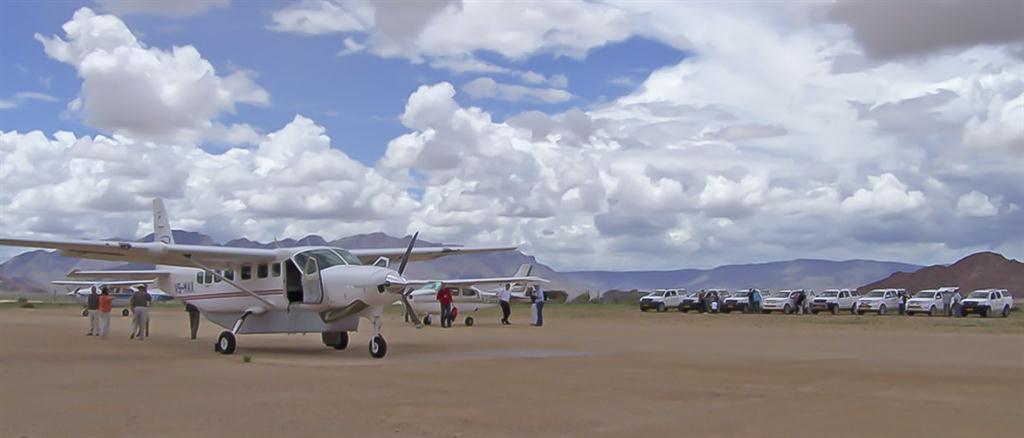New crisis for tourism
New civil aviation regulations published by the transport minister will shut down private airstrips and fly-in safaris in January, the tourism industry has warned.
Although Namibia has passed a ten-day International Civil Aviation Organisation (ICAO) security audit, a new tourism and aviation crisis looms over new regulations that will bar commercial aircraft from landing at unlicensed airfields.
The regulations, which will be effective from January 2019, will affect 100 airfields in Namibia.
The chairman of the Federation of Namibian Tourism Associations (Fenata), Bernd Schneider, says in a letter to tourism minister Pohamba Shifeta said that he was unofficially informed that Namibia had passed the ICAO audit.
The audit ended yesterday.
“This is tremendous and most welcome news and I would like to use this opportunity to express my gratitude on behalf of the tourism industry for your prompt response and assistance in helping solve this matter after being informed by us in October,” Schneider wrote.
He said unfortunately there were new stumbling blocks for the Namibian commercial aviation industry and the tourism industry in general. On 8 November, transport minister John Mutorwa published an amendment to the Civil Aviation Regulations in the Government Gazette.
“A core concern about the newly published regulations is that commercial flights are no longer allowed to land on unlicensed airfields, which were possible under the old regulations.”
He said fly-in safaris form a vital part of the Namibian tourism industry. Schneider pointed out that many lodges, especially those in remote areas, rely heavily on private landing strips to bring in customers.
“With the ever-deteriorating road conditions, flights with light aircraft have become an increasingly important mode of transport for the tourism industry,” he wrote.
He said the new regulations would effectively ground commercial flights to nearly 100 airfields from 1 January next year. That would affect more than 60 000 passengers per year.
Schneider said these regulations would also force most light-aircraft operators out of business, resulting in substantial job losses.
He said the Aircraft Owners and Pilots Association (AOPA) had sent a detailed submission to Mutorwa, highlighting the impact of the new regulations.
“As tourism industry we fully support safe air travel and any regulations that ensure overall aviation safety in Namibia. But regulations that have such a massive and far-reaching impact on an entire industry must be communicated well in advance and must be crafted with extensive stakeholder consultation. Both of these have been neglected,” said Schneider.
He said it was highly unlikely that all affected airfields would be able to comply with the new regulations in time.
An interim solution must be found urgently in order to prevent extensive and lasting damage to the tourism industry, he warned.
ELLANIE SMIT
The regulations, which will be effective from January 2019, will affect 100 airfields in Namibia.
The chairman of the Federation of Namibian Tourism Associations (Fenata), Bernd Schneider, says in a letter to tourism minister Pohamba Shifeta said that he was unofficially informed that Namibia had passed the ICAO audit.
The audit ended yesterday.
“This is tremendous and most welcome news and I would like to use this opportunity to express my gratitude on behalf of the tourism industry for your prompt response and assistance in helping solve this matter after being informed by us in October,” Schneider wrote.
He said unfortunately there were new stumbling blocks for the Namibian commercial aviation industry and the tourism industry in general. On 8 November, transport minister John Mutorwa published an amendment to the Civil Aviation Regulations in the Government Gazette.
“A core concern about the newly published regulations is that commercial flights are no longer allowed to land on unlicensed airfields, which were possible under the old regulations.”
He said fly-in safaris form a vital part of the Namibian tourism industry. Schneider pointed out that many lodges, especially those in remote areas, rely heavily on private landing strips to bring in customers.
“With the ever-deteriorating road conditions, flights with light aircraft have become an increasingly important mode of transport for the tourism industry,” he wrote.
He said the new regulations would effectively ground commercial flights to nearly 100 airfields from 1 January next year. That would affect more than 60 000 passengers per year.
Schneider said these regulations would also force most light-aircraft operators out of business, resulting in substantial job losses.
He said the Aircraft Owners and Pilots Association (AOPA) had sent a detailed submission to Mutorwa, highlighting the impact of the new regulations.
“As tourism industry we fully support safe air travel and any regulations that ensure overall aviation safety in Namibia. But regulations that have such a massive and far-reaching impact on an entire industry must be communicated well in advance and must be crafted with extensive stakeholder consultation. Both of these have been neglected,” said Schneider.
He said it was highly unlikely that all affected airfields would be able to comply with the new regulations in time.
An interim solution must be found urgently in order to prevent extensive and lasting damage to the tourism industry, he warned.
ELLANIE SMIT





Comments
Namibian Sun
No comments have been left on this article